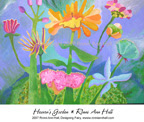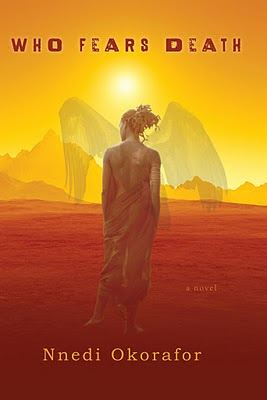At Powell's, our book buyers select all the new books in our vast inventory. If we need a book recommendation, we turn to our team of resident experts. Need a gift idea for a fan of vampire novels? Looking for a guide that will best demonstrate how to knit argyle socks? Need a book for [...]
Viewing: Blog Posts Tagged with: M. John Harrison, Most Recent at Top [Help]
Results 1 - 5 of 5
Blog: PowellsBooks.BLOG (Login to Add to MyJacketFlap)
JacketFlap tags: Biography, Mystery, Tim Powers, Jeff VanderMeer, M. John Harrison, Self Help, Louise Penny, Zora Neale Hurston, Pema Chodron, Roger Fisher, Andrea Camilleri, Ask a Book Buyer, Douglas Stone, Feminist Studies, Rebecca Walker, Tasha Alexander, Add a tag
Blog: The Mumpsimus (Login to Add to MyJacketFlap)
JacketFlap tags: Writing, fantasy, Delany, realism, M. John Harrison, worldbuilding, reality, science fiction, Add a tag
From three of the most interesting things I've read recently and, thus, started thinking about together...
M. John Harrison:
A world can be built in a sentence, but epic fantasy doesn’t want that. At the same time, it isn’t really baggy or capacious, like Pynchon or Gunter Grass. It has no V. It has no Dog Years. It has no David Foster Wallace. It isn’t a generous genre. The same few stolen cultures & bits of history, the same few biomes, the same few ideas about things. It’s a big bag but there isn’t much in it. With deftness, economy of line, good design, compression & use of modern materials, you could ram it full of stuff. You could really build a world. But for all the talk, that’s not what that kind of fantasy wants. It wants to get away from a world. This one.
Ian Sales on Leviathan Wakes by James S.A. Corey:
There are some 150 million people living in the Asteroid Belt. The greatest concentration is six million in the tunnels inside the dwarf planet Ceres. There is no diversity. There is passing mention of nationalities other than the authors’ own – and a bar the characters frequent plays banghra music – but the viewpoint cast are American in outlook and presentation. Ceres itself is like some inner city no-go zone, with organised crime, drug-dealing, prostitution, under-age prostitution, endemic violence against women, subsistence-level employment… Why? It’s simply not plausible. Why would a space-based settlement resemble the worst excesses of some bad US TV crime show? The Asteroid Belt is not the Wild West, criminals and undesirables can’t simply wander in of their own accord and set up shop. Any living space must be built and maintained and carefully controlled, and everything in it must in some way contribute. A space station is much like an oil rig in the North Sea – and you don’t get brothels on oil rigs.
Further, what does all this say about gender relations in the authors’ vision of the twenty-second century? That women still are second-class citizens. One major character’s boss is a woman, and another’s executive officer is also female. But that female boss plays only a small role, and everything the XO does she does because she has the male character’s permission to do so (and it’s not even a military spaceship).
Paul Di Filippo on Through the Valley of the Nest of Spiders by Samuel R. Delany:
Given that the book achieves liftoff into SF territory halfway through, you need to know that Delany does not stint on his speculative conceits. His hand is as sure as of old. The future history he creates is genuinely insightful and innovative. But it’s always background, half-seen. Because our heroes are living in a semi-rural backwater and are self-professed “Luddites,” their mode of life is more archaic than the lifestyles of others. But the shifting world keeps bumping up against them, rather in the manner of Haldeman’s The Forever War. Eric and Shit move ahead almost in a series of discontinuous jumps, waking up at random moments like Haldeman’s returning soldiers to find the world growing stranger and less comprehensible and less welcoming around them. It’s as if they are riding a time machin1 Comments on Worldbuilding, last added: 4/29/2012Display Comments Add a Comment
Blog: The Mumpsimus (Login to Add to MyJacketFlap)
JacketFlap tags: reality, Nnedi Okorafor, books, reviews, Africa, fantasy, narrative, M. John Harrison, Add a tag
I just finished writing a long review for Rain Taxi of Nnedi Okorafor's Who Fears Death, and it's one of those rare books that I just want to recommend to everybody. It's going to the top of my list of really good science fiction/fantasy novels that can be safely given to people who think they don't like SF, but it's also a book that can be appreciated both by people who merely want to read an engaging story and people who want more than just a good story.
I had so much fun writing a review of Who Fears Death because it is, among other things, very much a book about textuality and storytelling -- about how the stories we tell, the words we use, the structures and vantage points we select, affect our perception of the world. I kept thinking of some of M. John Harrison's books and the way they throw our readerly expectations and habits back in our face. Some of the pleasure, though, in reading Harrison is masochistic ("Yes, master, flog me again for my desire for fantasy!"), but the effect of Who Fears Death is very different, despite the many horrific events experienced or observed by the characters, because its view of fantasy is more generous -- the world is, it seems to say, made up of stories. They're how we understand things. So be careful in the stories you tell and the stories you listen to, but don't give up on myth and legend and fantasy. (In that, it's more Barry Lopez than M. John Harrison, really.)
Though the review I just sent off is 1,500 words, I felt like I could have gone on at twice that length, and I fear what I wrote is too general. I didn't even find a way to write about the epigraph from Patrice Lumumba that opens the book ("Dear friends, are you afraid of death?") -- one of the fascinating things about the novel is how it uses fantasy in a kind of dialogic approach to reality, thus illuminating both. For instance, part of the story uses a quest structure with echoes of Lord of the Rings (including a giant eye of evil) to critique both the good/evil dichotomy of so much epic fantasy and the good/evil thinking that fuels massacres and genocide in our own world. The stories we tell ourselves are not innocent -- they affect how we behave toward each other, and Who Fears Death shows that vividly. It's also about other types of fantasy -- for instance, the common one that the Harry Potter books so effectively exploited wherein nerdy or awkward folks become the saviors of the universe. Typically, once they've saved the universe, those characters go on to have great lives in the epilogues of their books. It doesn't really give too much away to say that Who Fears Death is smarter than that about what heroism and fate can demand, while also recognizing that stories, to be useful, may need to answer some of the ambiguities more common to life than fiction. Just because there are lots of lies in legends and myths doesn't mean we don't need them or that they don't tell truths about life; we just need to be careful in how and why we choose to keep telling them.
The method of the novel's telling will probably not obsess ordinary readers the way it did me, because I'm always obsessed with the 1 Comments on In Which I Exhort You to Read Who Fears Death by Nnedi Okorafor, last added: 6/3/2010
Blog: Neil Gaiman (Login to Add to MyJacketFlap)
JacketFlap tags: films, used books, the sleepover, book sculptures, suspension of disbelief, imitation, m. john harrison, when this was good, Add a tag
I'm slightly brain-dead right now -- yesterday I flew to LA, had a late-afternoon meeting about a movie I'm going to be writing based on one of my books (I don't think I can be more specific until all the contracts are signed or at least I know that I've got an okay to talk about it) which was really good. My producer is a writer, and he and I sat and agreed with each other about what I was going to be doing. The worst thing in writing something for someone else, and I've found this several times over the years, especially in movies, is where you talk to an editor or an executive and you think that you're talking about the same thing. Then you go away and do what you thought you were talking about and hand it in and find that you were quite wrong, and while you were describing (say) a romantic comedy with ghosts in they were buying a scary ghost story with perhaps some love in, and nobody is happy and the project is doomed. Anyway, this one will I think be just fine -- I felt like we were talking about the same book and the same movie.
Then my cell phone rang, and I found myself heading out to an Emergency Room at a hospital to see an embarrassed friend who had just had been admitted to the ER and had no desire to be there. On the whole it wasn't as intense as ER nor as funny as Scrubs but I definitely felt like I had wandered into American TV Fiction Land. Back to the hotel late, and worked on an overdue article on Crossover Fiction for the UK Writers and Artists Yearbook, because they had asked me to write something for them, and because the 1983 edition of the yearbook was the single most important and useful thing I owned when I set out to become a journalist.
A five in the morning wake-up call and off to the airport to fly home. Finished the Yearbook article in the Northwest Lounge. Sent it off. I slept a bit on the plane. I'd heard that "crippling" snow was expected in Minneapolis, but it was actually rain and didn't turn into snow until I had got home safely. And it was vital that I made it back in time because I had to get back home for...
The Sleepover. At which I was going to be The Adult. Starring Maddy and five of her thirteen/fourteen year old friends, at which I get to serve as chauffeur (to cinema and back) adviser ("you could probably put more cheese on those nachos"), placer-of-things-into-oven, and most importantly, because they had all just seen Prom Night and were a bit skittish, offerer of helpful advice ("You'll all want to stick together this evening. It's a big old house after all, and given the people who've died here over the years... well, I've said too much already..."). It's going on as I type this.
...
An article on writers blogging from The Age, in which we learn that this blog has jumped the shark, and is no longer as good as once it was. Probably true, although over seven years I've noticed it tends to go through phases. Still, if I do go on these research expeditions this summer I'll probably take a break from blogging while I'm doing it, and put it all into notebooks.
Lovely article on fantasy in the Daily Telegraph by Mark Chadbourne. For whose book The Fairy Feller's Master Stroke, I once wrote an introduction. I'll see if I can find it and put it up here. It's mostly about Richard Dadd, another of my obsessions.
...
Hi Neil,
I thought you might find this interesting: http://www.thedesignfiles.net
The idea of making such amazing sculptures out of books fascinates me (and makes me cringe a little bit--"no, not the books!"--but still, it's beautiful :)).
They are beautiful, aren't they?
You write great books. In fact, at one time you were my favorite writer, but then I picked up Viriconium by M. John Harrison only because in small black letters, near the bottom of the cover it says "With a Foreword by Neil Gaiman".
Now M. John Harrison is my favorite writer, and Viriconium is my bible. You knocked yourself out of the top spot. Introductions are like small bridges from author to author. Thank you for building so many.
Ironically yours,
Evan
P.S. The introduction is quite good.
You're very welcome. Mike Harrison is one of my favourite writers -- I'm delighted that he's now yours.
just wanted to tell you that your work religiously interrupts my being!!!!!
I hope that's good.
I'm a little forlorn at the moment. I had a wonderful talk with one of my professors today about how much we admire and enjoy your books. But that was following a very tough talk about how I have to rewrite my fiction piece for him. Again. Reason? Because he didn't believe character--due to the profession I labeled her with (Police officer)--think certain thoughts or be worried about things or would ever wish upon a star.
Police officers are humans too, right? They can still be disturbed by a rape case despite the fact that they're a seasoned officer? They still feel emotions?
[sigh] This rant was inspired by the fact that I read on your page that about 95% of what you write in your first draft ends up in your final product. Has that always been the case for you? Was there a time when someone refused your work because they point blank believed what you wrote is unrealistic? Or because you typically write in a magical fantasy world, do they give you certain allowances?
A student who knows her professor reads this page, and therefore remains nameless,
(despite the fact that she gave enough details that her professor will recognize her anyway...)
me.
Let's see. To answer the obvious questions first, was there a time someone turned down something I wrote because it was unrealistic? Probably, although nothing comes to mind. Normally they'd turn things down for just not being good enough.
You never have to convince a reader that Police Officers would wish on a star. You have to convince your readers that that police officer would wish on a star. You have to make someone rounded enough that the reader would half-expect the police officer in question to wish on a star.
Nobody gives you allowances for fantasy, just as nobody gives you allowances for romance or history or even non-fiction. It's called suspension of disbelief, and when you're writing it's what you're doing and what you're building, and it's soap-bubble thin. It pops easily. (I remember once being taken to task by Rachel Pollack for something in a short story I'd written. "But that's the only bit in the story that's true!" I told her. "It doesn't matter if it's true," she said. "What matters is if, in the context of the story, it's believable." And I knew that she was right.)
Incidentally, I've always found the police, in the US and the UK, tremendously helpful to writers, or at least to me. There's nothing like spending a day riding along with a cop, or being walked through a police station and getting to ask nosy questions for giving a writer confidence in what they're writing. And confidence is most of the battle.
The other day I was shopping in a used book store and suddenly realized that I don't know how authors get paid. I understand advances and royalties, etc. (at least well enough) but:
1. Do authors get royalties on new books and used? Sales numbers are only on new books, so...
2. And book clubs - anything from there?
I make enough to buy my books new, but haven't always - I'm not trying to disparage used books shops and libraries. If buying books new means more money for the writers (& illustrators), which leads to more books, then, well, I'll buy them new.
Thanks, looking forward to "The Graveyard Book" (although I wish it were out now to coincide with the dreary spring weather in the upper midwest)
ethan
No, authors don't get paid anything for books in used bookstores -- but then, we've already been paid for them. Someone bought them once, and I'm happy for them to be resold. (As I said in Wired (full reply by me here) and repeated in this journal,
If you buy one of my books (or are sent it to review) it's yours. You bought it (or were given it). You can sell it on. I don't have any more of a problem with Amazon listing the used copies than I do bookstores having used book sections. It's their store.And six years on, I've not changed my mind.
You can buy a book new, buy it in hardback or wait for the paperback, find it used or as a collectible. I don't mind. What I care about most is that people are reading.
As I said when I discussed this at length in the piece I put up on this journal that was quoted in Wired last month, books don't come with single-end-user licenses, and I think that's a good thing.
Writers do fine from book clubs, too -- the book club isn't paying a royalty on each book. Usually they'll pay a fee to the publisher, which is split with the author, for permission to publish a book (often at a smaller size or on cheaper paper than the original) or they will contract with the publisher to overprint copies for them as part of the original print run (so the Book Club editions of the original Stardust hardcover are just like the DC edition, identical in size and binding and paper, they just ran off a few thousand at the end of the print run with the Book Club logo on).
Hi Neil!
I just read a book by a German author who borrowed some stuff from your novels, especially Neverwhere. The story takes place in (a) London Below and Mr. Croup and Mr. Vandemaar show up as well (with different names), and some other details were terribly familiar.
I was just wondering what you think of somebody else using "your" ideas & characters. Is it something that annoys you? Do you feel honoured? Do you even care?
I hope you haven't answered this question already - if yes, I couldn't find it and would love a hint in the right direction.
Thanks in advance!
L.
There's a saying that imitation is the sincerest form of flattery, and the truth is that mostly I feel flattered when I hear about things like this. It's classier when the people doing it list you as an influence in interviews or thank you in the acknowledgments or whatever, but it doesn't bother me either way.
Blog: Designing Fairy (Login to Add to MyJacketFlap)
JacketFlap tags: paintings, blue energy, Add a tag



 I went into my studio, and found all my BLUE paintings and noticed a theme: I like blue in my paintings! I've been studying the effects of color on our mood and for healing and blue, although can stand for being sad and down, I find that blue is used for soothing and comforting, especially if it is a soft light blue.
I went into my studio, and found all my BLUE paintings and noticed a theme: I like blue in my paintings! I've been studying the effects of color on our mood and for healing and blue, although can stand for being sad and down, I find that blue is used for soothing and comforting, especially if it is a soft light blue.
(Oh, happy to say I'm painting again! I've gotten tons of ideas for paintings coming to me left and right! Thank you DOG!)
For bigger views, click on the main page here.





Lots to think about here, but I'm particularly interested in the importance of intensity in fiction.